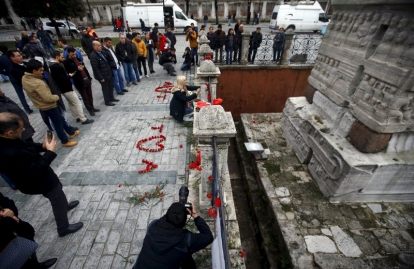Iman Chairman condemns Istanbul bombing, urges change in Turkish policy
Miércoles, 13 Enero 2016 Image Credit: Reuters/Osman Orsal
Image Credit: Reuters/Osman Orsal
'Istanbul bombing: Turkey is overwhelmed by a whirlwind of regional challenges'
NEWSWEEK
The suicide bomb attack that hit Istanbul on Tuesday, resulting in ten, mostly German, fatalities in the tourist district of Sultanahmet, is symptomatic of the innumerable challenges facing the Turkish government.
Top among them is combatting the Islamic State militant group (ISIS), which Prime Minister Ahmet Davutoglu implicated as the main culprit.
ISIS militants have perpetrated a number of major, violent attacks in Turkey, including the death of nearly 100 pro-Kurdish and left-wing activists in Ankara in October 2015.
But the Istanbul attack constitutes a wholly different magnitude in its targeting of the vital tourist sector that accounts for a staggering 12 percent of the Turkish economy, according to a recent report by the World Travel and Tourism Council. Government officials had, accordingly, a strong incentive to respond robustly and swiftly to contain the negative repercussions of this event on an already stagnant economic growth profile.
While Turkey views ISIS as a clear and present danger, and has adopted security measures against the radical Islamists, the group is hardly the only threat to Turkey’s stability. It is host to approximately 2.5 million Syrian refugees and shares a 910-kilometre porous border with Syria along which tens of thousands of mainly Islamist fighters are entrenched. The country suffers from near complete isolation in the Middle East, and its military is engaged in urban warfare against the Kurdistan Workers’ Party (PKK) in southeastern Turkey.
President Erdogan tends to blame outsiders for Turkey’s growing litany of problems rather than government policy. He identifies Syrian President Bashar Al-Assad and Washington’s reticence to deepening involvement in Syria as the reason for the existence of ISIS. He has narrowed the Kurdish issue in Turkey to simply PKK militancy. He has even gone as far as to claim that the elusive “interest rate lobby” and an ill-defined “higher mind” are responsible for Turkey’s internal and external predicaments.
Conspiracy theories can hardly, however, come close to explaining Turkey’s fragile situation. Its abandonment of a traditionally balanced, non-interventionist, flexible and pro-Western foreign policy in favour of a more ideologically-driven orientation has dragged this strategic country to the heart of the political fissures and sectarian schisms tearing the region apart.
Only by carrying out a 180-degree turn in its policies will Turkey become a stabilizing force in the Middle East, stemming the ill-effects of the Syrian quagmire and the implosion of Iraq while generating domestic tranquility and reclaiming the regional prominence it once enjoyed not so long ago.
Iman Chairman Ribal Al-Assad condemned the bombings in Istanbul and added that the attacks were sadly predictable.
“This utterly deplorable attack on innocent and unsuspecting victims once again shows the hideous face of Islamic extremism, and we condemn the violence in the strongest possible terms,” he said.
“But the Turkish authorities should not act surprised when the rabid dog of Islamism finally bites the hand that feeds it.
“Turkey has for many years supported Islamic extremist groups, including Islamic State, in their effort to topple the Syrian government.
“I have consistently warned that this policy is extremely reckless and irresponsible.
“Not only has it brought great misery to Syria, but it has created a grave threat to Turkish and indeed global security.
“Islamic extremist groups are not simply pawns to be played with in geopolitical games, but political actors with their own objectives and allegiances.
“These groups believe that all Turkish people and territory should be part of the Islamic state they want to create between Xinjiang in China and Andalusia in Spain. They regard Turkey as an ally of the West and as a state which upholds democratic values, which are of course contrary to their own totalitarian beliefs.
“They owe no allegiance to the Turkish state and, like the Islamist mujahideen who were backed by the West and its allies in the Gulf and who later became al-Qa'eda, they will turn on their erstwhile allies when they believe the time is right. As recent spate of attacks in Turkey demonstrate, that time appears to have come.
“Turkish leaders must realise that any support or toleration of Islamic extremist groups is entirely contrary to their national security. For the sake of the Turkish people, therefore, Turkish government policy must change course immediately."
Más artículos de noticias »